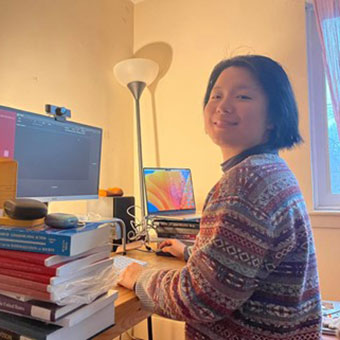Manning Zhang
- PhD student, 3rd year
- Graduate program: Sociology and Social Policy
 Manning at work
Manning at work
Spotlight Interview
The responses have been edited for clarity and length.
URCC: Did you participate in undergraduate research as an undergraduate?
Manning: Yes! I did participate in a couple of qualitative studies as an undergraduate. Funded by a university undergraduate research grant (FDUROP), my bachelor thesis research investigated Chinese farmers’ responses to land transfer and land marketization, to show a bottom-up narrative of China’s land reform in addition to the top-down narrative formed by abstract policy language. This research idea was generated from an earlier research field trip during which my teammates and I worked as research assistants and conducted interviews with farmers in different villages to know about how they fertilize their crops. As a kid growing up in the city, the stories my interlocutors shared familiarized me with their struggles in dealing with land transfer policies and motivated me to further research this issue. In 2019, I stayed in a village near my home city during the summer and finished more than 40 interviews and hours of ethnographic observation and used these materials to finish my thesis.
URCC: Who were your undergraduate research mentors and how did they advise you? How did this experience affect your current academic and research path?
Manning: I had two amazing mentors during my thesis prep period: Professor Yi Zhou and Professor Ronggui Huang. Professor Zhou’s course “Cultural Sociology” triggered my interest in exploring the beautiful world of culture, and motivated me to apply for a PhD program after finishing undergraduate studies. Professor Huang’s expertise in social network analysis inspired me to experiment with mixed method research design in my later studies: as an undergraduate student, I was not confident enough to step out of my comfort zone of qualitative research. But when I had more opportunities to receive training of multiple methods as a PhD student, I realized how the seed of mixed-method thinking was planted by working with these two professors as an undergraduate researcher.
URCC: What advice can you give to undergraduate who want to enter a research- and teaching-focused PhD?
Manning: Think wildly, find the most suitable way to spend your undergraduate time, be sensitive to the resources around you, and try your best to be confident in yourself!
URCC: What is your focus of your current research? How have you partnered with undergraduates on this or other projects?
Manning: I am currently working on two projects. By doing in-depth interviews and ethnographic observation at a gym, I seek to know more about young people’s motivation to do fitness training, and how their race and ethnicity, gender, socioeconomic status, as well as other sociological characteristics relate to their experience. Inspired by Michael Burawoy’s extended case methods, I try to investigate how fitness can be a case of the intertwined relationship between culture and economy. My other research uses a China national dataset to explore how senior people’s migration may affect their access to health care. This question is in line with my long-lasting concern in people’s hesitation in using primary care service in China, which harms the equilibrium of supply and demand in health care resources. Apart from interlocutors, currently I am not working with any undergraduate students in these projects. But I always welcome such opportunities and am happy to help build up undergraduate researchers’ work.
URCC: What lessons have you learned by serving as a URCC Graduate Peer Research Mentor?
Manning: I served as Graduate Lead Research Mentor in the fall semester, and participated in a series of planning, negotiation, and mentoring work. I was amazed at seeing so many aspiring ideas among mentors and mentees... The best moments for me are to see people with similar passion for research gather together. In the majority of my research time, I stay alone and work independently. Serving the group and bringing everybody together makes me feel rewarded and less lonely. In the work I also learned how to deal with uncertainties — Margaret (the URCC Director) and I started this project from scratch. I learned from Margaret that leadership is accompanied with great flexibility, calmness, and the ability to bear fuzziness. This experience greatly equipped me with organizational skills.
URCC: What actionable advice can you give for aspiring mentors?
Manning: I appreciate your willingness to share and help! Please keep in mind that everybody’s social context may impact what the best decision is for them. Try to understand your mentees’ situation before giving them your advice. And convince yourself that your insightful advice will surely inspire them in different ways.